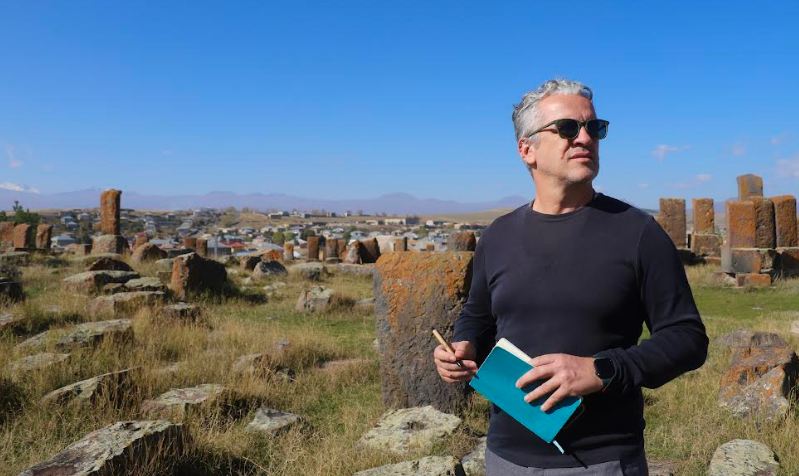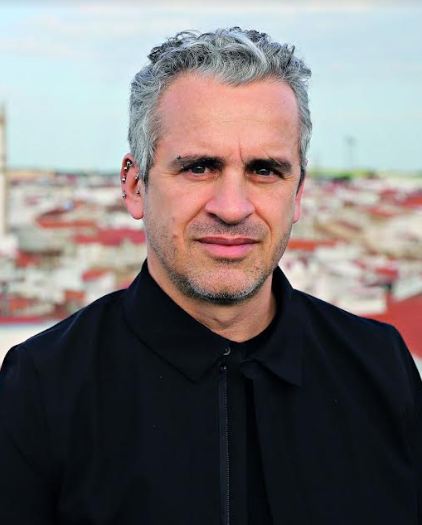AB Khan/Centreline team
José Luís Peixoto is one of Portugal’s most acclaimed contemporary writers. His vast work in fiction, non- fiction, poetry and children’s literature has received several portuguese and international awards, such as the José Saramago Literary Award, Libro d’ Europa and Oceanos Literature Award, and was shortlisted for the IMPAC Dublin Literary Award and the Femina Prize.
He was born in 1974, in a small village from the south interior of Portugal, in the Portuguese region of Alentejo. He finished a degree on Modern Languages and Literature in the Universidade Nova de Lisboa. Was a teacher for some years in Portugal and in Cabo Verde before becoming a professional writer in 2001.
Peixoto’s works often explore the complexities of human relationships, the rural landscape and the impact of societal changes on traditional ways of life. He is known for his evocative prose and deep insights into the human condition.
“He‘s a man who knows how to write and
who is the successor to the great writers.”
José Saramago
Peixoto’s books are currently translated into 34 languages.Here are some of the publishing houses where Peixoto’s
books are available:
Bloomsbury (UK), Doubleday, Random House (US), Grasset (France), Seuil (France), Literatura Random House (spanish-speaking countries), Companhia das Letras (Brazil), Einaudi (Italy), Kedros (Greece), Meulenhoff (Nederlands), Atlas Contact (Nederlands), Kineret (Israel), Wsoy (Finland), Polirom (Romania), Bozicevic (Croatia), Bakur Sulakauri (Georgia), among many others.
XXXXXXXXXXXX
ISLAMABAD: Salt and Pepper hairdo, pierced ears and eyebrows, leaned body and honey dew tone and tenor may confuse oneself for a heavy rock band star ready to hit the notes. However, the gentleman sitting comfortably on a sofa is in fact, Jose Luis Piexoto, the Portuguese most acclaimed and bestselling novelist, a literature Wizkid when introduced. His resume is more than impressive. The list of his accomplishments in fiction, non-fiction, poetry and children’s literature far surpasses many of his peers and even contemporaries. Recipient of Jose Saramago Literary award, Libro d Europa and Oceanos prize, his journey in the world of literature started at a very young age. “I was in my teens when I started writing poetry and that was my very first experience. However, as a teenager one goes through a lot of changes and a lot of discoveries and so it helped me organize myself in certain way because poetry is such a condensed form of literature which helps you to reach new horizons” explains the literati.

His first book, Morreste-me (You Died on Me) was published when he was 25 years old. The book is a very detailed account of relationship between the writer and his father. As one flips through the pages of this short story, one finds itself present at the scene along with the author himself. The description of the hospital room, the bedroom of the house, the fireplace, narration of the buildings in the neighborhood is so intricately sketched that one can see visuals while going through the texts. Although the book is not an exciting read as it narrates the harsh reality of a dying father and the helplessness of a son whose deep love for his father comes to light in every sentence.
Jose’s second publication was a novel titled Nenhum Olhar (Blank Gaze) which won him the prestigious Jose Saramago award named after the Portuguese noble laurate at the age of 27. Blank Gaze which has been translated in more than 20 languages is all fictional. The character in the story, the Devil, Siamese twins, the giant and the shepherd are all are all connected with one common threat, the fate.
Your travelogues like Inside the secret, Book and The Imperfect Path do not excite readers to visit these countries as a tourist whereas Travelodge’s meant to do the very same. Your comment?
“To answer your question, out of the three, Livro (Book) is not a Travelodge. It’s a novel and it describes experience that I did not live myself. Having said that, it was lived by hundreds and thousands of Portuguese in 60’s and 70’s and among them my parents included. They were immigrants also, who migrated to the suburbs of Paris, France and that was the exodus of Portuguese people. One and a half million Portuguese went to France in that period and the journey was painful. There was censorship, dictatorship, war and poverty. It was a very difficult period in Portuguese history.
Now on the other two books, Inside the secret on North Korea and The Imperfect Path on Thailand, I have not tried to impose my opinion on the places, but tried to describe my experience as a Portuguese tourist. I feel that sometimes the touristic narrative, gives a portrait of a country that is very shallow and superficial. So, I made an effort to dig deeper and write on the unchartered territories of these two countries.
Jose Luis’s novel Galveias is named after his birth place, Galveias, a small village in the Portuguese region of Alentejo. “Yes, I have deliberately named the novel Galveias to give my village a tribute. However, your take on the novel reading from far away will be very different from a reader who is an inhabitant of Galveias and knows the streets, café, schools and the roads that I had mention in the novel” answer the writer.
The two children book A Mae que Chovia (The Mother who Rain)published in 2012 and Todos os Escritores do Mundo Tem a Cabeca Chela de Piolhos (All the writers of the World have their heads full of Lice) in 2016 were written after birth of his own children. “The idea to write children’s book grew after I had my children. I had to tell them stories to make them sleep”, informs the father of two boys. He accepts that children literature is very specific. It has different layers and different tones, and sometimes as grownups we forgot to see the world from their perspective which is sad, he adds.
q-Was the success of your first book at the age of 25 the reason for your inspiration to write more and more an expand your horizons trying your luck in other mediums?
a-After my teenage years, I had always been dreaming of writing books. l used to look up to writers and poets at that time and it was my wildest dream to become one of them. It was the Jose Saramago award which encouraged me to write professionally as it brought me to limelight. Secondly when I was a teacher as well, I had always though to continue writing books while teaching. Professional writing also provides livelihood an di was always very open to ideas not confining to one medium only”, he informs
Although the writer confessed that he never tried his vocals for singing or held a paint brush in his hand, but his pursuit for working with musicians, with visual artists, painters kept pulling him towards the performing art and that it provided a great impetus in his writing.
Jose Luis Piexoto termed his visit to Pakistan as an eye opener. He attended the Literature Festival in Lahore and spent two days in Islamabad. “My perception of this country was totally opposite before coming here. It is very unfortunate that the west has portrayed Pakistan with a lot of fallacies, misleading narratives. I started to get an insight about Pakistan when I planned to visit Lahore to attend the Literature festival and it started to change right then. The literati promises to write a Travelodge on Pakistan someday but looks forward for a lot of input from his Pakistani fraternity.
INSET SCREEN
Awards
Galveias – The Best Translation Award Japan 2019 (Best foreign novel translated into japanese in 2019)
Galveias – Prémio Oceanos 2016 (Best novel published in all portuguese-speaking countries in 2015)
Livro – Prémio Libro d’Europa 2013 (Best novel published in Europe in 2012)
A Criança em Ruínas- Prémio da Sociedade Portuguesa de Autores 2013 (Best poetry book published in Portugal on the previous year)
Gaveta de Papéis – Prémio de Poesia Daniel
Faria 2008 (Best poetry book published in Portugal by a poet under 35 years old)
Cemitério de Pianos – Prémio Cálamo 2007 (Best foreign
novel published in Spain in 2007)
Nenhum Olhar – Prémio Literário José
Saramago 2001 (Best novel published in all portuguese speaking countries on the two previous years)
Morreste-me (Prose, 2000)
Nenhum Olhar (Novel, 2000)
A Criança em Ruínas (Poetry, 2001) Uma Casa na Escuridão (Novel, 2002) A Casa, a Escuridão (Poetry, 2002)
B
Antídoto (Prose, 2003)
I Cemitério de Pianos (Novel, 2006)
B Cal (Prose and Theater, 2007) L Gaveta de Papéis (Poetry, 2008) I Livro (Novel, 2010)
O Abraço (Prose, 2011)
G A Mãe que Chovia (Children’s, 2012)
R Dentro do Segredo (Travel, 2012)
A Galveias (Novel, 2014)
P Em Teu Ventre (Novella, 2015)
H Todos os Escritores do Mundo Têm a Cabeça Cheia de
Y Piolhos (Children’s, 2016) Estrangeiras (Theater, 2016)
O Caminho Imperfeito (Travel, 2017) Autobiografia (Novel, 2019) Regresso a Casa(Poetry, 2020) Almoço de Domingo (Novel, 2021) Onde (Narrative, 2022)
RECEPTION
‘Peixoto has an extraordinary way of perceiving, conveyed in his original choices of language and imagery’
Times Literary Supplement
“Splendidly demanding…. The images Peixoto evokes in helping his characters communicate without words are singular and unforgettable…. Nature appears to prevail as the governing force, and Peixoto’s brilliance and power as an artist are precisely in his desire to mimic nature’s ability to create and destroy simultaneously.”
San Francisco Chronicle
“Peixoto offers an appealing addition to the genre of rural
magical realism…. [A] poignant debut.”
Kirkus Reviews
“You read and breathe as if you were downing a bottle of life in one gulp.”
Le Figaro (about Blank Gaze)
‘Peixoto has an acute ear for cadence, a sharp eye for the
luminous image and a good nose for the pungent’
Independent
‘Peixoto’s evocation of pathos is tempered by a keen sense of the absurd’ Financial Times.











